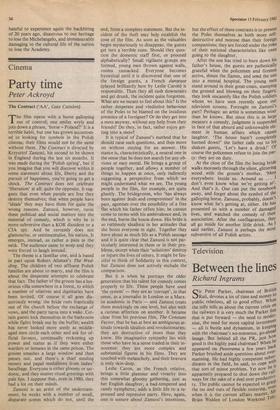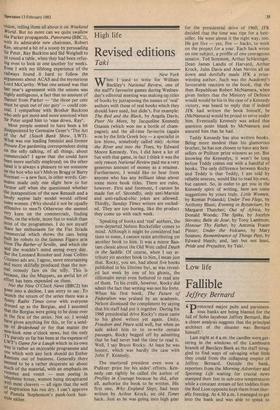Between the lines
Richard Ingrains
CC it Peter Parker, chairman of British ORail, devotes a lot of time and money to public relations, all to good effect. When the telly tells us about the current crisis on the railways it is very much the Parker line that is put forward — the need to moder- nise, the need for more capital investment — all is bustle and dynamism, in keeping, with the chairman's no-nonsense, go-abaci image. But behind all the PR, just how good is the highly paid chairman? When he appeared on Panorama a few years bac/c Parker brushed aside questions about over- manning. He had highly competent sub?,,- dinates in the field, he said, to cope wit", that sort of minor problem. Yet now he!' apparently prepared to shut down the rn1.1- ways for the sake of a deal over productivi- ty. The public cannot be expected to graspthe ins and outs of flexible rostering, eve',,
when it is the current affairs master, „, Brian Walden of London Weekend Tele-
vision, telling them all about it on Weekend World. But no more can we quite swallow the Parker propaganda. Panorama (BBC1), with its admirable new chairman, Robert Kee, secured a bit of a scoop by persuading Sir Peter, Ray Buckton and Sid Weighell to sit round a table, when they had been refus- ing even to look at one another for weeks. Even I with my lifelong experience of the railways found it hard to follow the arguments about ACAS and the mysterious Lord McCarthy. What one sensed was that last year's agreement with the unions was highly ambiguous, a fact that no amount of flannel from Parker — 'the three per cent Must be spun out of our guts' — could con- ceal. I sympathise with Brother Buckton who only got more and more annoyed when Sir Peter urged him to 'ease down, Ray'.
Most people seemed to have been a bit disappointed by Germaine Greer's 'The Art of the Ad' (South Bank Show, LWT). What was our leading feminist and former Private Eye gardening correspOndent doing on the telly talking, of all things, about commercials? I agree that she could have been more usefully employed; on the other hand it is always a pleasure to see someone on box who isn't Melvyn Bragg or Barry Norman — a new face, in other words. Ger- maine made only one slight bow to her former self when she questioned whether the juxtaposition of the new Renault and a lovely supine lady model would offend some women. (Why should it not be equally offensive to men?) Otherwise she seemed very keen on the commercials, finding them, on the whole, more fun to watch than most of the programmes. I do not myself she her enthusiasm for the Fiat Strada commercial which shows the cars being built by robots to the famous Figaro aria from The Barber of Seville, and which she said she wouldn't mind seeing every day. But the Leonard Rossiter and Joan Collins Cinzano ads are, I agree, more entertaining and more skilfully produced than the nor- Mal comedy fare on the telly. This is because, like the Muppets, an awful lot of effort has been expended on them. Not the Nine O'Clock News (BBC2) has g, one into a decline, I am sorry to say. To launch the return of the series there was a funny Radio Times cover with everyone dressed up as the Borgias, and I assumed that the Borgias were going to be done over 111 the first of the series. Not so. I would have given anything for this, or for a send- uP Brideshead or for that matter the new-look nine o'clock news, but the only Tv Parody so far has been at the expense of 1-WT's Game for a Laugh which in its own Way is rather an enjoyable programme and one which with any luck should do Esther Xantzen out of business. Generally there seemed to be a rather desperate air about Much of the material, with an emphasis on violence and vomit — men peeing in telephone boxes, women being decapitated With meat cleavers — all signs that the well °f inspiration has run dry. I can't approve °f Pamela Stephenson's punk-look hair- style either.











































 Previous page
Previous page